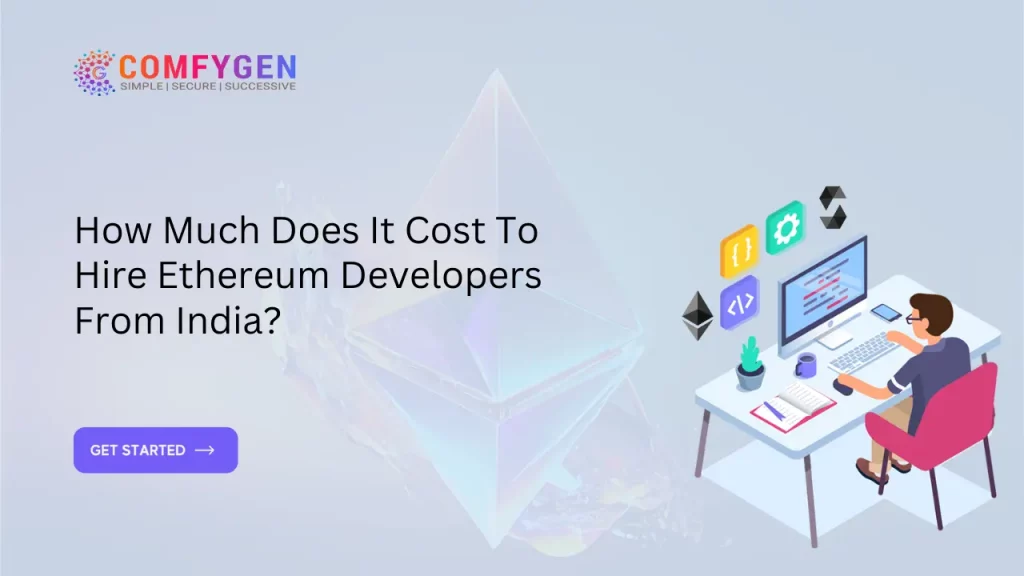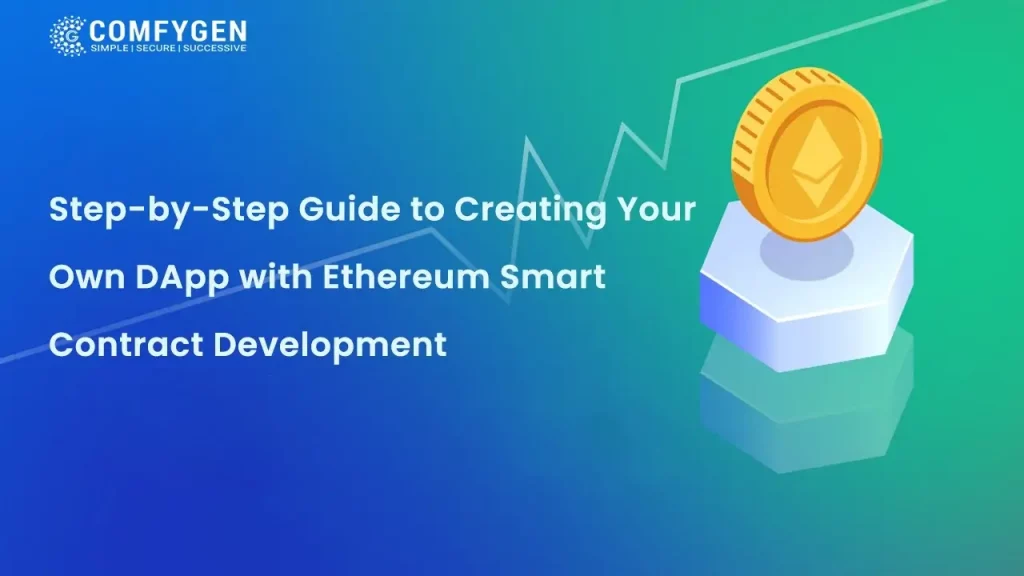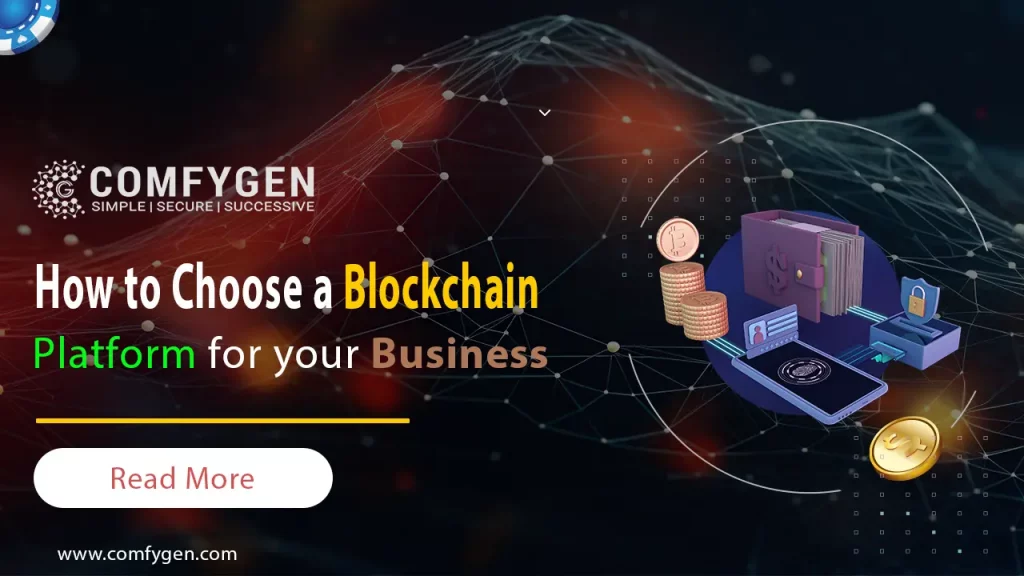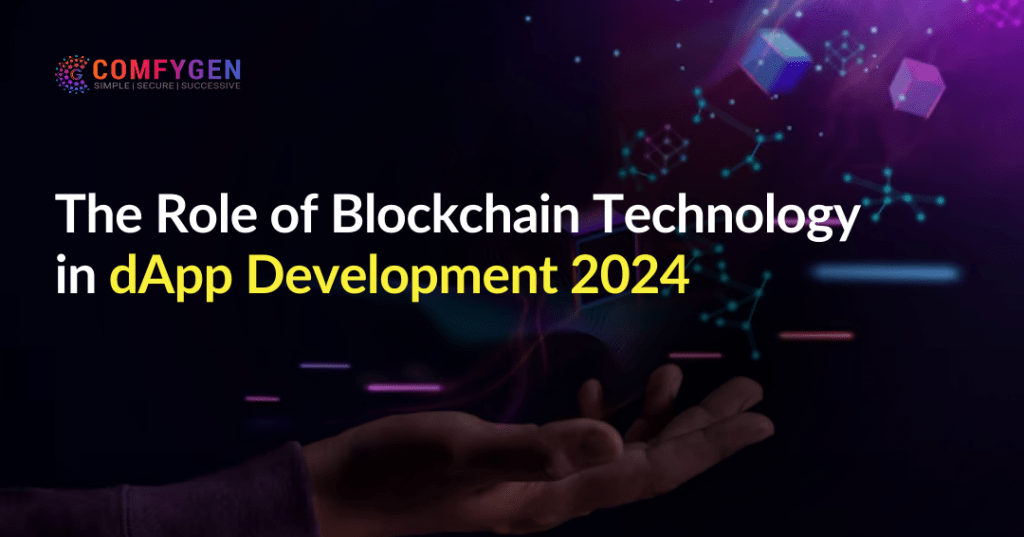
Businesses, at some stage, are usually searching out new methods to remain ahead in the continuously changing panorama of the technology industry. The introduction of blockchain technology and decentralized packages (dApps) has offered businesses with new avenues. Mainly in operational transformation, protection enhancement, and profit generation.
You may be surprised to know that there are approximately 4,000 dApps in the marketplace. DApps development services helps to build a more open, safe, and censorship-resistant digital surroundings with the use of dispensed ledger technology. According to Dot Com Infoway, the blockchain market is anticipated to attain $20 billion in value by 2024, from an approximate $1.57 billion valuation in 2018. Here, have a look at how blockchain technology is getting used inside the development of dApps and the way it is changing the landscape of software packages.
Decentralized Application Types
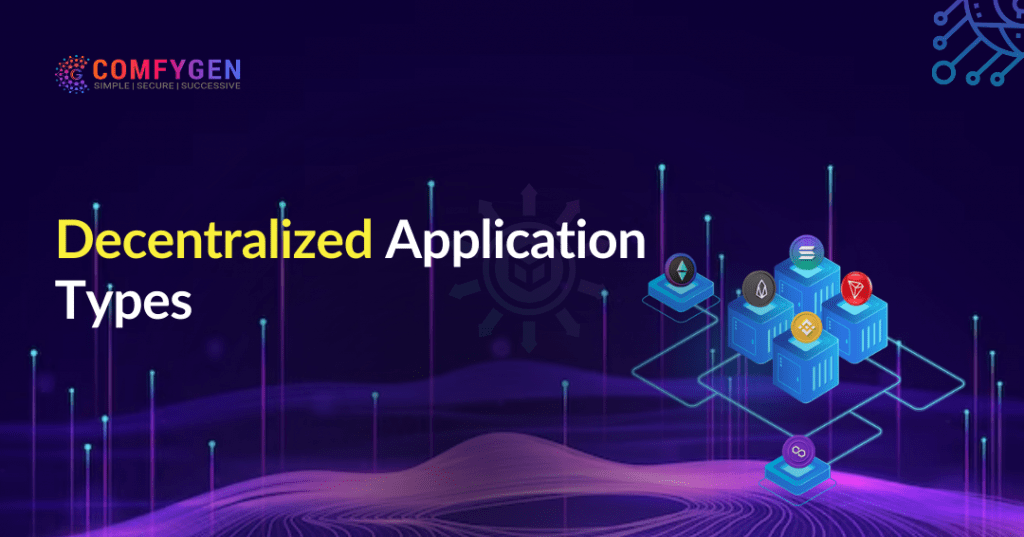
DApp development in the main falls into three categories. These are divided into groups according to their uses and qualities:
- Form I: The preliminary form of dApp development developed from the ground up. A blockchain designed for specialized data storage and wider use needs to use Type I dApp development. Every dApp kind has its own Blockchain Development Services.
- Type II: Tokens are utilized to get access to pre-constructed decentralized packages based on blockchain era.
- Type III: In this case, a plug-in or an extension is applied as the interface, but tokens are still used to get admission to Ethereum Blockchain-based Computing Platform for DApps.
A long affiliation whose necessities are to provide the records only accessible to parties they aid is probably encouraged by the first form of DApp, which takes lots of money and time to built with no prior making plans. For the general public, Types II and III are useful. Anyone can take part within the process through meeting the necessities of the mentioned Blockchain.
Essential Features of Decentralized Apps (dApps):
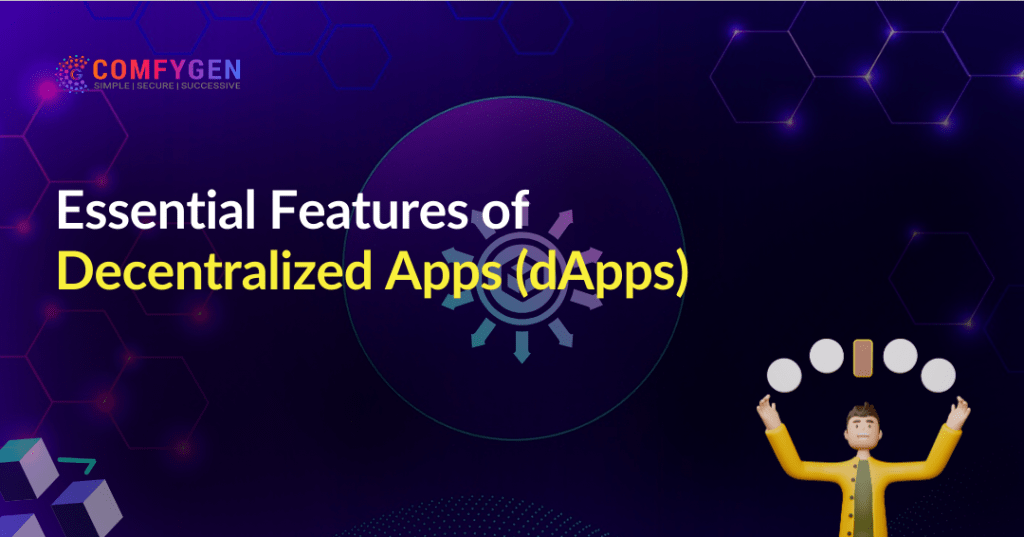
Decentralization is the fundamental idea at the back of all dApps. There is no need for a central authority or intermediary as those apps run on a peer-to-peer community. Getting rid of single points of failure improves safety but also cultivates an environment that is extra inclusive and democratic. Here are some of its essential features:
- Open source code
Due to the open nature of their code, dApps’ core functionality and logic are available to anyone. This openness allows to verify the app’s integrity and comprehend its workings while additionally making sure community participation in improved.
- Integration with Blockchain
The incorporation of blockchain generation into dApps is essential to their premise. Every transaction and action made in the blockchain mobile application development services is recorded with the help of the Blockchain, which acts as an impenetrable and tamper-resistant ledger. Users will feel much more trusted as an end result, and they may also be advanced.
- Tokenization
In dApps, tokens built on the Blockchain are utilized to permit value transactions in the applicatios. These tokens, which could stand for a number of sources or functions, are regularly used as rewards for customers and Hire blockchain developers. These tokens are simpler to create and administer because of smart contracts, which can be pieces of self-executing blockchain code.
Read more: The Ultimate Guide for Real-World Asset Tokenization on Blockchain Development
Business Prospects with Blockchain dApp Development
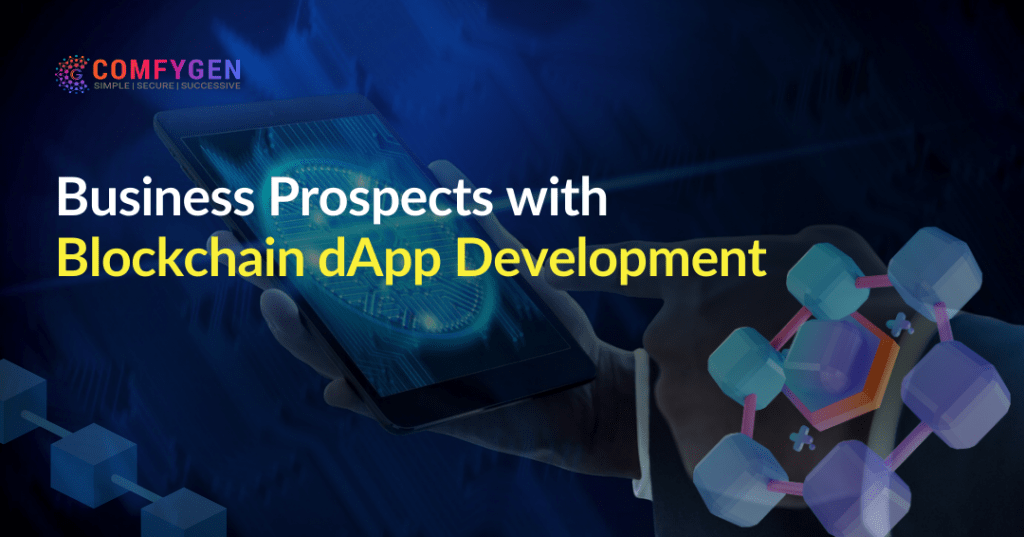
Blockchain technology which has its origins in 1980s was supposed to underpin the essential design of cryptocurrencies. Today, it has evolved into a multipurpose instrument utilized in numerous other fields. The driving force behind this alteration is dApps, or decentralized apps. Due to their decentralized network structure, dApps on blockchain offer business previously unheard-of benefits in terms of performance, protection, and transparency.
- Streamlining Process: One of the financial possibilities that incorporates using dApps with blockchain technology is the capacity to streamline procedures. With dApps, lots of commercial enterprise methods can be enhanced and automated, casting off the need for intermediaries and reducing the probability of mistakes.
- Smart contracts: dApps on Blockchain are efficient due to the fact that they remove the need for middlemen in contractual procedures as they are self-executing programs with the agreement’s terms encoded into their code. The development of smart contracts reduces charges for agencies and expedites transactions.
Read More: Creating Your Own DApp with Ethereum Smart Contract Development: A Step-by-Step Guide! - New revenue sources: Companies might also use Blockchain-based decentralized utility improvement to investigate new sales streams, particularly with the issuance of tokens or the creation of decentralized markets. These changes could offer new techniques for increasing income and expanding the business.
- Improved security: Enhanced security is becoming more crucial to business. This is because of the continuous increase in cyber threats and other data breaches that can occur at any time. Data is saved safe way with the usage of blockchain’s decentralized nature, which reduces the opportunity of unauthorized access or modification.
- Greater Openness and Trust: Reliable enterprise partnerships are predicated on trust. Blockchain-based dApps create a obvious, immutable file that encourages trust with amongst stakeholders and customers. This increased transparency will lead to brand reputation and purchaser loyalty.
- Reduced Expenses: By doing away with the need for middlemen like banks to help transactions, corporations can lower working expenses with the help of using Blockchain-primarily based dApps.
Businesses can use smart contracts to automate more than a few company activities, including inventory management, supply chain management, and payment processing. This permits them to cut down time, and sources wanted to complete tasks by hand, which lowers operational costs.
What Operational Changes Could dApps on Blockchain Bring to Businesses?
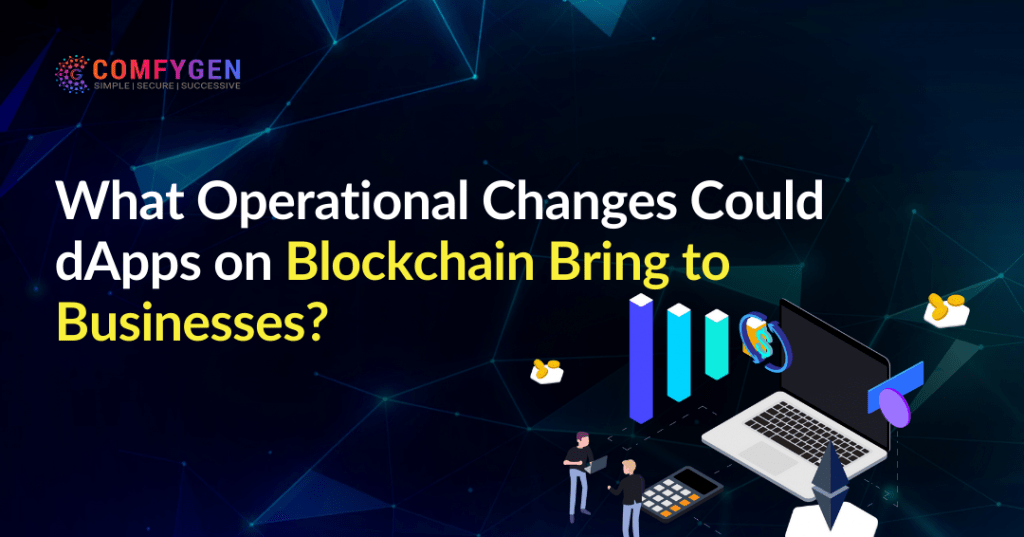
Blockchain DApps have transformed traditional enterprise strategies, enhancing operational efficiency. Reputable blockchain dApp development companies are aware about the importance of decentralized apps in reworking the way businesses function.
- Smart Contracts for Smooth Transactions: Using smart contracts in enterprise operations can automate and speed up transaction procedures. A blockchain dApp development company works on developing clever contracts that meet specific business needs and make transactions rapid, reliable, and budget-friendly.
- Decentralized Data Management: Businesses cope with big data information through decentralized statistics management. Blockchain dApps make sure that data is securely saved, auditable, and unmanipulated by providing decentralized facts control solutions. This simultaneously enhances records safety and streamlines compliance tactics.
- Supply Chain Openness: Businesses across quite a number industries are starting to apprehend the importance of supply chain transparency. Businesses can use decentralized solutions to gain full visibility in their supply chains with Blockchain dApp development.
dApp Applications
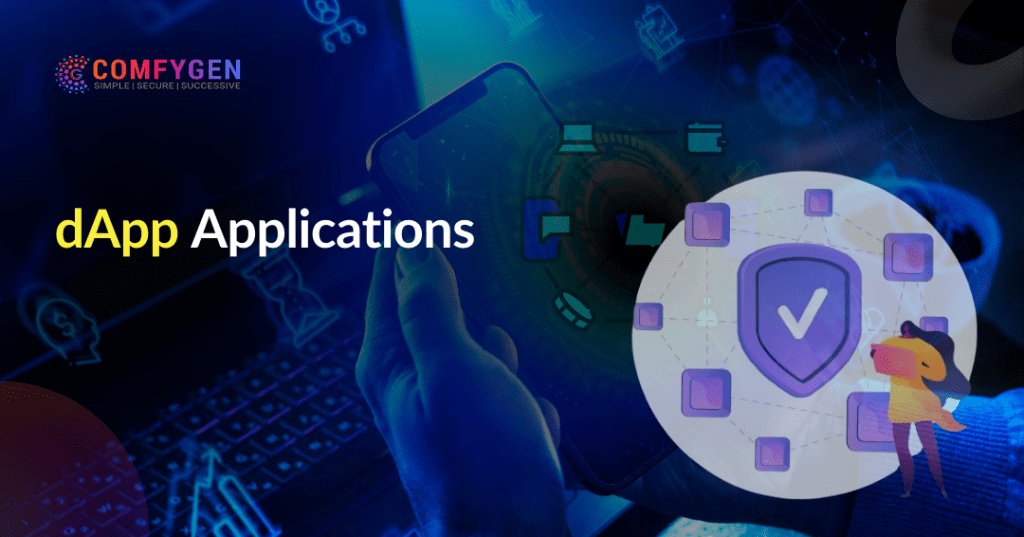
Due to dApps’ adaptability, they may be implemented in a wide variety of industries, transforming workflows and procedures. Among the noteworthy dApp applications are:
- Supply Chain Management: Traceability and transparency in the supply chain are improved with Blockchains that are integrated with dApps. It helps to track the flow of commodities and also authenticate them in every step thought the process.
- Digital Identity Verification: By allowing safe, decentralized identity verification, dApps offer users autonomy over how they deal with their private records, independent of centralized companies.
- Decentralized Finance (DeFi) Platforms: Many financial services are done without middlemen. You may wonder how it is possible. It can be done with the use of the latest feature called Decentralized Finance (DeFi) platforms. These DeFi DApps development services make use of blockchain technology.
- Gaming and entertainment: Secure digital asset buying, promoting, and selling is made feasible by blockchain-based gaming dApps, which provide transparent and verifiable in-game asset ownership.
Want to Develop DApps Application
The Future For dApp Development
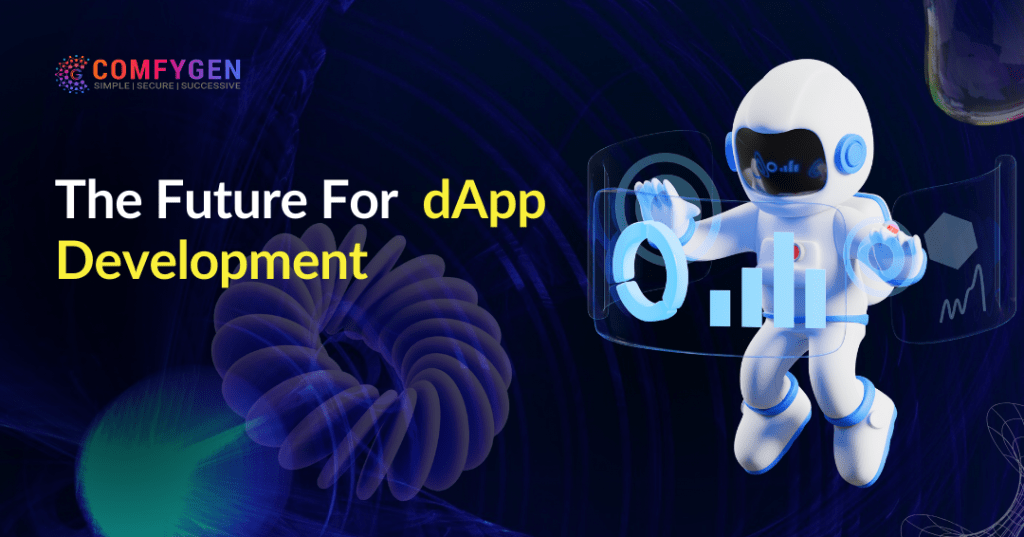
It is predicted that as dApps evolve, several industries will see extensive breakthroughs and advances. These are some potential trends and tendencies.
- Improved Governance Models: Decentralized Autonomous Organisations (DAOs) and other extra-sophisticated governance models can be integrated into future dApps. Community-driven selection-making is made viable with these models, giving customers a voice inside the boom and course of the dApp.
- Cross-Chain Interoperability: dApps will put increasingly more effort into turning into cross-chain interoperable a good way to communicate with one another throughout diverse blockchain networks. By doing this, customers can be able to get access to a greater variety of decentralized packages and enhance interoperability.
- Interoperability with Conventional Systems: dApps may also endeavor in the future to perform interoperability with traditional centralized structures. This will enable a quicker transition to decentralized technology and ease the adoption of dApps throughout various agencies with the help of providing seamless integration with present day infrastructure.
- AI Integration: More sensible and automatic features might be feasible with the combination of AI technology with dApps. AI algorithms can be applied to dApps for purposes along with customized user experiences, statistics analysis, and pattern recognition.
- Better User Onboarding and Adoption: To promote broader adoption, upcoming dApps will give attention to streamlining the onboarding process. To attract and hold people, this includes developing user-friendly interfaces, providing educational materials, and providing rewards.
- Through these projects, people with special technological backgrounds can have easy access to dApps.
Read More: How to Build Deploy dApp on Solana Blockchain?
Final Thoughts
DApps built on the Blockchain are simply making matters less complicated. They provide affordability, security, and transparency throughout a wide range of businesses. Even though there may be some troubles, dApps have to be used more regularly as layer 2 solutions, interoperability, and user-friendly interfaces. dApps have the power to disrupt current strategies and offer a more open, powerful, and inclusive future for organizations, people, and industries.
